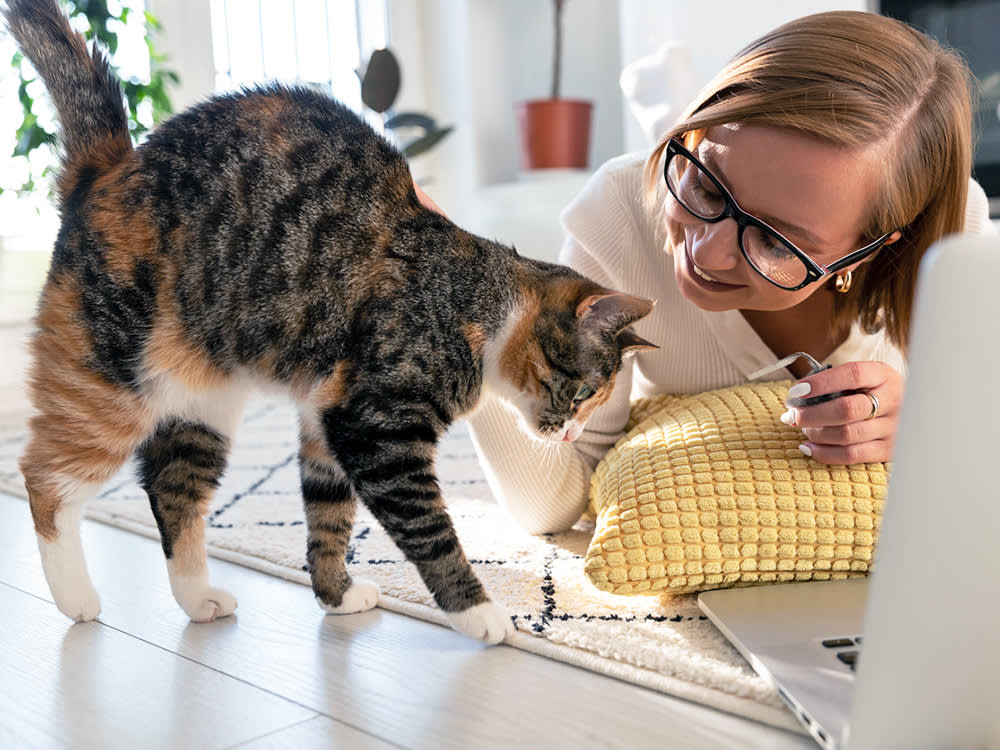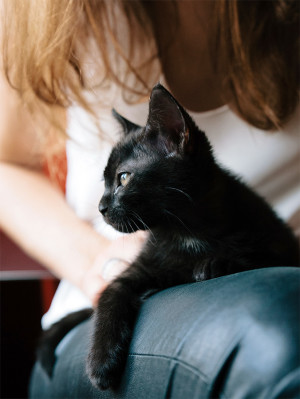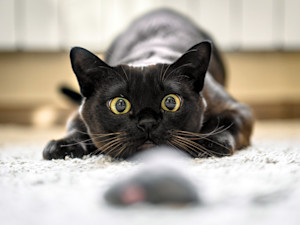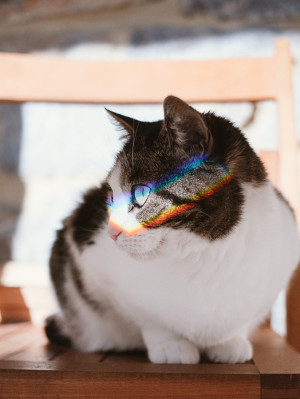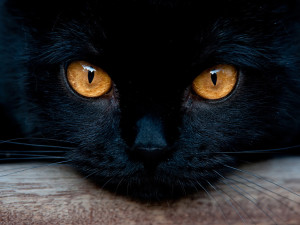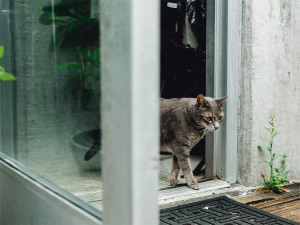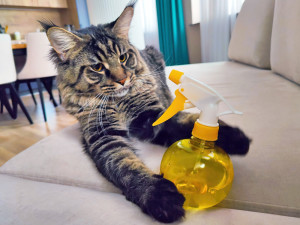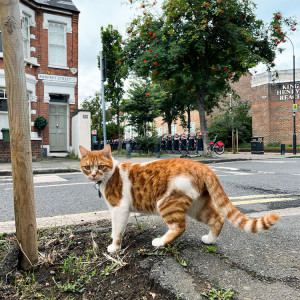Does Your Cat Recognise Your Voice?
Or are they just ignoring you...
If you’ve ever had a full-blown conversation with your cat (we’re not judging), you’ll know it can be a pretty one-sided affair. We know deep down they probably haven’t a clue what we’re saying – unless it’s the word ‘Dreamies’ said alongside the telltale shake of the bag – but do our feline pals at least recognise the voices of their humans? If you’ve ever called your cat in from outside and had them come running, or indeed the complete opposite and had them totally ignore you, you might wonder whether they know it’s you calling them (and if they’re ignoring you, are they being purposefully stubborn?) We spoke to the experts to find out just how much our cats understand when we try to communicate with them.
Does my cat know my voice?
One study from Japan in 2013opens in a new tab suggests cats can recognise our individual voices. Researchers found that 15 of the 20 cats they tested showed a “significant” response when played the sound of their owner’s voice instead of a stranger’s.
littleKin™ is Kinship’s home just for puppy and kitten parents. Bop over to check out expert advice, new pet tools, and special deals—all curated for your newest family member.
opens in a new tab“The cats were much more likely to turn their head, turn their ears towards the sound, than if a stranger was calling their voice,” explains Dr Wanda McCormick, head of the animal and agriculture department at Hartpury University. “It was definitely the voice and not the way it was being presented.”
To check the cats were responding to their owners and not just the sound of their name, the strangers were asked to mimic the way owners said it. The evidence suggests cats actually differentiate between vocal tones and how their name is said, explains Daniel Warren-Cummings, central behaviour officer for Cats Protection.
“How much they pay attention, though, is the real question,” he says. “And the way they interpret sounds, we’re not entirely clear on.”
What other cues do cats use to understand us?
We know that cats are equipped with an arsenal of super-senses, from amazing hearing (up to 85 kHzopens in a new tab in comparison to humans’ 20 kHz) to specially adapted eyes that can see in low light and an acute sense of smell (which is 9–16 times strongeropens in a new tab than humans), but when it comes to recognising humans by our voices and faces, can they pick their pet parents out of a line-up?
Another studyopens in a new tab by the same group of researchers in 2019 seems to suggest that cats don’t just rely on sound to differentiate between humans. They tested whether cats that lived in both domestic households and cat cafes recognised familiar faces.
“The researchers showed cats an image of either their pet parent or a stranger, and then played either the pet parent’s voice calling their name or a stranger’s, so it mismatched,” explains Dr McCormick. “For the ones that lived in a house, it didn’t seem to make any difference whether the picture matched the voice they were hearing, it was the voice that seemed to matter. But in the cafe cats, they were much more interested if it didn’t match.”
In a similar studyopens in a new tab on cat cafe cats, researcher Charlotte de Mouzon of Paris Nanterre University’s Laboratory of Compared Ethology and Cognition first got the cafe cats used to her presence, then she put them through different scenarios. The cats would enter a room and De Mouzon interacted with them in one of four ways: she called out to them but made no gestures towards them otherwise; she gestured towards them but didn’t vocalise; she both vocalised and gestured towards them; and, in the fourth, control condition, she did neither.
The cats approached the researcher the fastest when she used both vocal and visual cues to call them, compared to the control condition. They also found that the cats responded quicker to the visual cues alone than they did to the vocal cues.
This suggests that because the cafe cats had so much stimulus in their environment, they couldn’t just rely on the voices – they had to use visual recognition as well. But for domestic cats who only ever see their owner, the sound was enough.
It’s all about the context
You may have also noticed your cat responding in different ways to different people entering your home and wondered whether they can remember a friend who’s visited in the past, or if anyone who isn’t you just screams ‘stranger danger’ to them. Which senses tell our cats whether it’s safe or to flee?
“Humans rely on so many sensory inputs, we don’t pay much attention to finite detail. But cats’ sense of hearing is much better than ours; their frequency range is broader and more sensitive,” explains Dr McCormick. If a stranger enters your home, “they’ll be picking up on the sound of the individual coming in rather than the scent at that time”.
Cats will also pick up signals from how you enter their home, says Daniel. Perhaps you jangle your keys a certain way or always arrive at the same time – these are clues that tell your cat whether it’s you, he explains.
“It’s more likely a combination of things beyond just senses, it’s everything around the context. If you regularly go out at 5pm and come back at 8pm, the cat might be used to that routine. The real test would be if we put the cat and owners in a new environment without any of these contextual cues,” says Daniel. “How long would it take the cat to realise that the owner had walked into this space?”
Would my cat come if a stranger called them?
It’s fairly certain is that if a stranger came into a cat’s house and said their name, it’s unlikely they’d come running, says Daniel.
“Your cat will have learnt associations with you standing at the back door and calling it in. If a stranger was to do that, we wouldn’t expect them to respond in the same way. They’re not going to go, ‘I’m being called in, it doesn’t matter who’s calling me’, they’ll always respond to what else is going on in the scenario.”
Science seems to back this up. In the earlier Japanese study, the cats were initially played the sound of three strangers calling their names before hearing the pet parents’ versions. Initially, they reacted to anyone calling their name but gradually responded less to the strangers.
“They realised it wasn’t relevant, so they definitely showed a discrimination between when the owner called them versus when someone else called them,” says Dr McCormick. “Their owner’s voice in general would get their attention, it’s just whether they cared to respond to it or not.”
So why do our cats often ignore us?
This is, indeed, the big question. If we’re fairly certain cats recognise our voices, why do they often appear to blank us entirely? In part, it’s down to how they’ve been domesticated, explains Dr McCormick. Cats have only lived alongside humans for about 9,000 years, she says, whereas dogs have been trained as man’s best friend for 15,000. Then there’s nature: cats are an innately solitary species.
“The biggest thing to understand with cats is that they don’t respond to humans in the way dogs do. Cats are far more reserved in their response – it tends to be far more subtle behaviour,” she adds.
We’re perhaps even being a little unfair in our expectations of our cats, suggests Daniel. We don’t train them to recognise their name or certain words the way we do dogs, so why should we expect them to react when we call?
“More often than not, if your cat isn’t responding, it’s not because they’re being petulant or spiteful, it’s probably that the name or word means nothing to them,” he says. He also points out that we don’t expect our cat to respond to what it hears most of the time, which is the white noise of our daily conversations.
“So to suddenly say ‘I expect you to respond to me, I expect you to know that I’m talking to you’ – even before we consider the cat’s own limitations of understanding – is a very anthropocentric view of ‘it’s my world and you should respond when I want you to’.”
Though you could, in theory, teach your cat to respond to your voice using positive reinforcement (say their name, throw a treat, repeat), it’s perhaps asking a lot. Cats have enough to process without adding a training programme to the mix, says Daniel.
“We might look at them and think they’re standing in an empty room but actually someone has walked in and trailed in all these smells and the cat suddenly has all this information to process, so why would it pay attention to you making a sound that isn’t directly beneficial to them? They perceive the world in such a different way, we sometimes don’t give them credit that they’re just processing information we’re not capable of understanding.”
So the next time you call your cat and they turn and walk the other way, don’t be offended, just remember that their wilful independence is part of the reason we love them in the first place.
